Birds are curious creatures and enjoy a variety of foods beyond their typical diet of seeds, fruits and insects. Popcorn is a popular snack among humans but can it be safely shared with our feathered friends? In this comprehensive guide, we explore whether birds can eat popcorn, the nutritional benefits and risks, and how to prepare popcorn in a way that ensures the health and safety of your avian visitors.
Whether you’re an avid bird watcher or a casual bird feeder, understanding the dos and don’ts of feeding popcorn to birds can help you make informed choices that benefit these beautiful creatures.
Yes, birds can eat popcorn but it must be plain, unsalted, and unbuttered. Salted or flavored popcorn can be harmful to birds due to high sodium and artificial additives. To safely offer popcorn to birds, use air-popped popcorn without any added ingredients. Always provide it in moderation as an occasional treat alongside a balanced diet of seeds, fruits, and nuts.
Can Birds Eat Popcorn?
Birds are curious and often enjoy a variety of foods beyond their usual diet of seeds, fruits, and insects. Popcorn is one such treat that many bird enthusiasts consider offering to their feathered friends. However, it’s essential to understand the nuances of feeding popcorn to birds to ensure their safety and health. Here, we delve into the details of whether birds can eat popcorn, how to prepare it, and the potential benefits and risks.
Nutritional Value of Popcorn
Popcorn, when prepared correctly, can be a low-calorie treat that offers some nutritional benefits. It is a whole grain and contains small amounts of fiber, vitamins, and minerals. However, its nutritional value can be significantly altered by the addition of salt, butter, and other flavorings, which are common in commercial popcorn.
- Fiber: Helps in digestion, which is beneficial for birds.
- Protein: Essential for the growth and repair of tissues.
- Iron: Important for the formation of hemoglobin in the blood.
- Magnesium: Necessary for numerous biochemical reactions in the bird’s body.
- Antioxidants: Helps in fighting free radicals.
Related reading:What do dead birds symbolize in the bible?
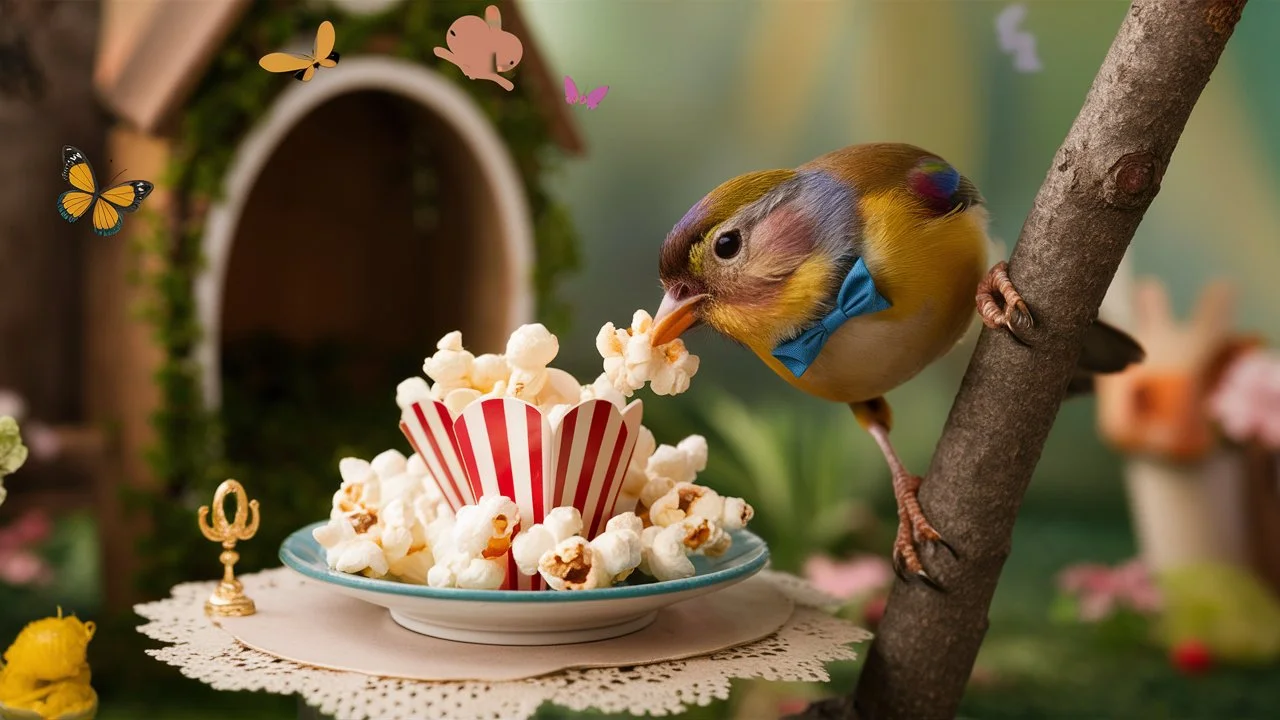
Is Popcorn Safe for Birds?
The short answer is yes, birds can eat popcorn, but with specific precautions. Here’s a detailed look at how to ensure popcorn is safe for your avian friends.
Plain and Unsalted
The most critical factor when offering popcorn to birds is ensuring it is plain and unsalted. Salt can be harmful to birds as their bodies are not equipped to handle high levels of sodium. Salt toxicity can lead to severe health issues, including kidney failure and dehydration.
- Why Avoid Salt: Birds’ kidneys are not as efficient at excreting salt as mammals, making even small amounts potentially dangerous.
Unbuttered and Unflavored
Butter and other flavorings commonly added to popcorn can contain ingredients that are unhealthy or toxic to birds. These additives can include artificial flavorings, preservatives, and unhealthy fats.
- Healthy Preparation: Air-popped popcorn is the best option because it avoids the use of oil and butter.
Popped vs. Unpopped Kernels
Birds can eat both popped and unpopped kernels, but there are considerations for each.
- Popped Kernels: Easier for birds to eat and digest. They can peck at the fluffy pieces, which are more palatable and pose less of a choking hazard.
- Unpopped Kernels: Hard and can be difficult for smaller birds to handle. Larger birds with stronger beaks can manage unpopped kernels, but it’s generally safer to stick with popped kernels.
Benefits of Feeding Popcorn to Birds
When prepared correctly, popcorn can be an enjoyable and beneficial treat for birds. Here are some potential benefits:
- Enrichment: Popcorn can provide mental stimulation and physical activity for birds as they peck and play with the popcorn.
- Bonding: Feeding popcorn can be a fun way for bird owners to interact and bond with their pets.
- Variety: Introducing new foods like popcorn can add variety to a bird’s diet, which can help prevent boredom.
How to Prepare Popcorn for Birds
Proper preparation of popcorn is crucial to ensure it is safe for birds. Here’s a step-by-step guide:
- Air-Pop the Popcorn:
- Use an air popper to make popcorn without oil or butter. This method ensures the popcorn is plain and healthy.
- Avoid Salt and Seasonings:
- Do not add salt, butter, or any other seasonings. Birds should only eat plain, unseasoned popcorn.
- Cool Down:
- Let the popcorn cool completely before offering it to birds. Hot popcorn can cause burns.
- Serve in Moderation:
- Offer popcorn as an occasional treat rather than a regular part of the diet. A small handful is enough for a treat.
- Clean Up:
- Ensure any leftover popcorn is cleaned up to prevent mold growth or attracting pests.
Risks of Feeding Popcorn to Birds
While popcorn can be a safe treat when prepared correctly, there are potential risks to be aware of:
Choking Hazard
- Unpopped Kernels: These can pose a choking hazard, especially for smaller birds. It’s safer to offer only popped kernels.
Nutritional Imbalance
- Empty Calories: Popcorn should not replace a bird’s regular diet. Birds require a balanced diet rich in seeds, fruits, vegetables, and insects. Overfeeding popcorn can lead to nutritional deficiencies.
Mold and Bacteria
- Spoiled Popcorn: Leftover popcorn can become moldy or attract bacteria, which can be harmful to birds. Always ensure that leftover popcorn is cleaned up promptly.
Alternatives to Popcorn
If you’re looking for other healthy treats to offer your birds, consider the following options:
- Fruits: Apples, berries, and bananas (ensure no seeds or pits are present).
- Vegetables: Carrots, peas, and leafy greens.
- Seeds and Nuts: Sunflower seeds, pumpkin seeds, and unsalted nuts (in moderation).
- Insects: Mealworms and crickets for insectivorous birds.
Can Birds Eat Popcorn Seeds?
Popcorn seeds, also known as unpopped kernels, are a common byproduct when making popcorn. While popcorn itself can be a safe and enjoyable treat for birds when prepared correctly, the question arises whether these hard, unpopped kernels are safe for birds to consume. In this detailed guide, we’ll explore the safety, benefits, and potential risks of feeding popcorn seeds to birds.
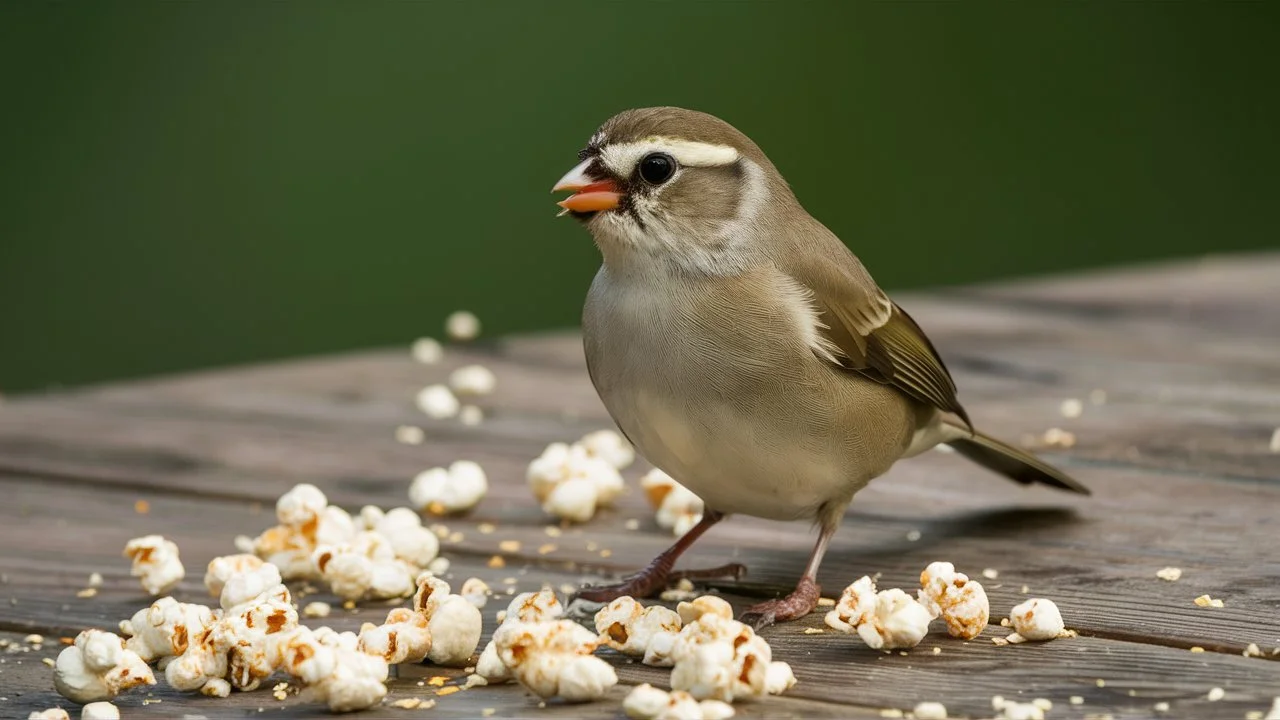
Nutritional Value of Popcorn Seeds
Popcorn seeds are whole grains and contain a variety of nutrients that can be beneficial for birds:
- Fiber: Essential for digestion and overall gastrointestinal health.
- Protein: Important for growth, repair, and maintenance of tissues.
- Vitamins and Minerals: Including magnesium, phosphorus, and a small amount of iron.
Despite these nutritional benefits, the physical properties of popcorn seeds present certain challenges and risks.
Physical Challenges of Popcorn Seeds
Hardness and Size
Popcorn seeds are notably hard and small, which can pose a challenge for many birds, especially smaller species. Here are some of the issues related to their hardness and size:
- Choking Hazard: Small, hard kernels can become lodged in a bird’s throat, causing choking.
- Digestive Issues: The hard texture of popcorn seeds can be difficult for birds to break down and digest, potentially leading to digestive problems.
- Beak Damage: Repeated attempts to crack open hard kernels could cause wear or damage to a bird’s beak, particularly in smaller species or those not adapted to handling hard seeds.
Which Birds Can Eat Popcorn Seeds?
Some birds are better equipped to handle popcorn seeds than others. Typically, larger bird species with stronger beaks are more likely to manage these hard kernels without issue. Here are a few examples:
- Parrots: Many parrot species have strong beaks capable of cracking open hard seeds.
- Macaws: Known for their powerful beaks, macaws can easily handle hard kernels.
- Crows and Ravens: These intelligent birds have the strength and ingenuity to deal with tough seeds.
While these birds might manage to eat popcorn seeds, it’s still important to consider the potential risks and ensure the kernels are offered safely.
Safe Feeding Practices for Popcorn Seeds
If you decide to offer popcorn seeds to birds, follow these guidelines to minimize risks:
- Crack or Soften the Kernels:
- Crack the kernels into smaller pieces using a nutcracker or similar tool.
- Soak the kernels in water overnight to soften them, making them easier to eat.
- Offer in Moderation:
- Popcorn seeds should be an occasional treat, not a staple of the diet. Overfeeding can lead to nutritional imbalances.
- Supervise Feeding:
- Observe birds when they are eating popcorn seeds to ensure they do not struggle with the hardness or size of the kernels.
- Provide Alternatives:
- Consider offering alternative treats that are safer and easier to eat, such as sunflower seeds, millet, or specially formulated birdseed mixes.
Potential Risks of Feeding Popcorn Seeds
Despite precautions, there are inherent risks in feeding popcorn seeds to birds:
Choking Hazard
- Small Kernels: The small size of popcorn seeds can make them easy to inhale or choke on, particularly for smaller bird species.
Digestive Issues
- Indigestibility: The hard outer shell of popcorn seeds can be difficult to digest, potentially leading to gastrointestinal blockages or discomfort.
Nutritional Imbalance
- Limited Nutritional Value: While popcorn seeds do contain some nutrients, they lack the balanced nutrition provided by a bird’s regular diet. Relying too heavily on such treats can lead to deficiencies.
Alternatives to Popcorn Seeds
If you want to provide your birds with a variety of treats while ensuring their safety and health, consider these alternatives:
- Sunflower Seeds: Easy to eat and rich in healthy fats.
- Millet: A favorite among many small bird species and easy to digest.
- Pumpkin Seeds: Nutrient-rich and larger, making them easier for larger birds to handle.
- Birdseed Mixes: Specially formulated to provide balanced nutrition and safe to eat.
Can Birds Eat Popcorn in the Winter?
Feeding birds during the winter can be a rewarding activity, as many birds rely on supplemental food sources to survive the cold months when natural food is scarce. Popcorn can be a part of this supplementary feeding, but there are important considerations to keep in mind to ensure the health and safety of the birds. In this guide, we will explore whether birds can eat popcorn in the winter, the nutritional benefits and risks, and best practices for feeding popcorn to birds during this season.
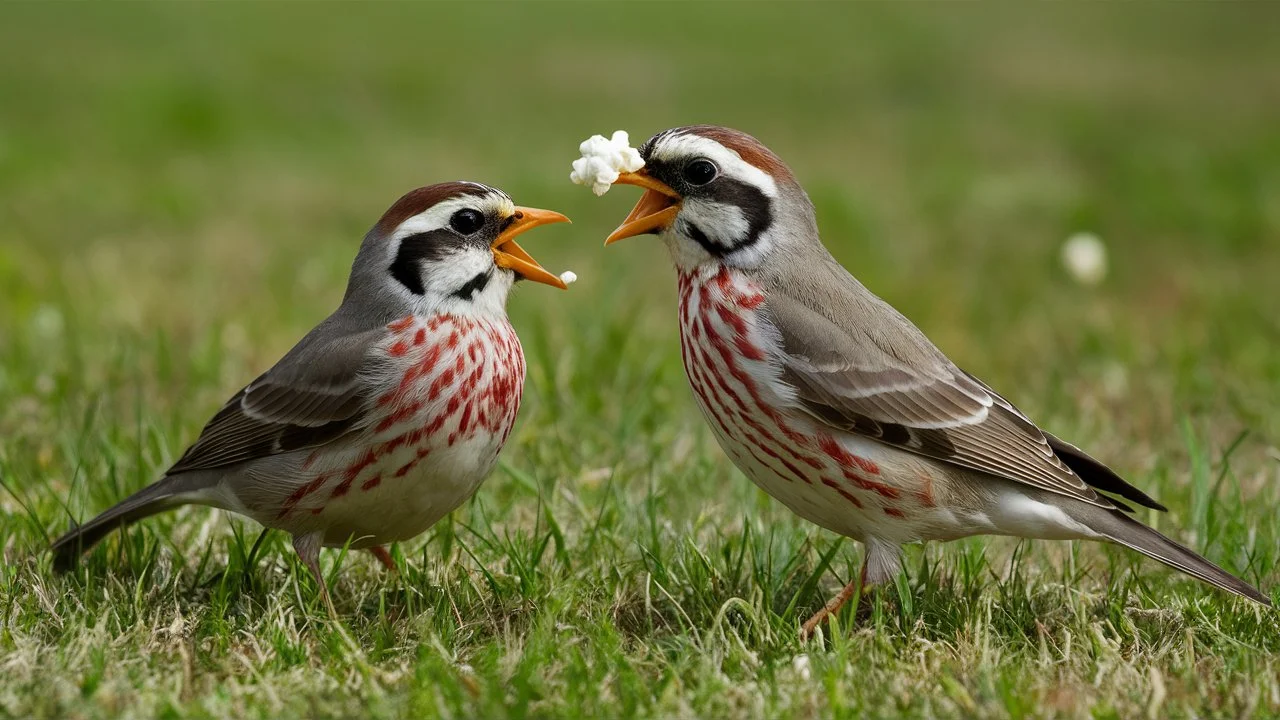
Nutritional Value of Popcorn for Birds
Popcorn, when prepared correctly, can offer some nutritional benefits. It is a whole grain and contains small amounts of fiber, vitamins, and minerals. During winter, birds need energy-rich foods to maintain their body heat and energy levels. Here’s a quick look at what popcorn can provide:
- Fiber: Aids in digestion.
- Carbohydrates: Provide a quick energy source.
- Vitamins and Minerals: Including magnesium and iron, which support overall health.
Preparing Popcorn for Birds in Winter
The way popcorn is prepared can significantly impact its safety and nutritional value for birds. Here’s how to ensure popcorn is bird-friendly:
Plain and Unsalted
Popcorn should be plain and unsalted. Salted popcorn can be harmful to birds as their bodies cannot handle high levels of sodium, which can lead to dehydration and other health issues.
- Avoid Salt: Even small amounts of salt can be toxic to birds.
Unbuttered and Unflavored
Butter and other flavorings commonly added to popcorn contain ingredients that can be harmful to birds, including unhealthy fats and artificial additives.
- Use Air-Popped Popcorn: Air-popped popcorn is the best option as it does not contain any added oils or flavorings.
Cool Down the Popcorn
Before offering popcorn to birds, ensure it has cooled completely. Hot popcorn can cause burns and be uncomfortable for birds to handle.
Benefits of Feeding Popcorn to Birds in Winter
Feeding birds popcorn in the winter can have several benefits:
Energy Source
- High in Carbohydrates: Popcorn provides a quick energy boost, which is essential for birds to maintain their body heat during the cold months.
Enrichment
- Mental and Physical Stimulation: Peeking and playing with popcorn can provide mental stimulation and physical activity for birds, helping to keep them active and engaged.
Easy to Prepare
- Convenient: Popcorn is easy to prepare and can be made in large batches, making it a convenient option for bird feeders.
Potential Risks of Feeding Popcorn to Birds in Winter
While popcorn can be a safe treat when prepared correctly, there are potential risks to be aware of:
Nutritional Imbalance
- Empty Calories: While popcorn provides energy, it lacks the comprehensive nutrients found in seeds, fruits, and insects that birds need for a balanced diet.
Mold and Bacteria
- Spoiled Popcorn: Popcorn left out in wet or damp conditions can quickly become moldy, which can be harmful to birds. Always ensure that popcorn is kept dry and fresh.
Overfeeding
- Dietary Balance: Popcorn should only be an occasional treat and not a staple of the bird’s diet. Overfeeding can lead to nutritional deficiencies.
Best Practices for Feeding Popcorn to Birds in Winter
To safely feed popcorn to birds during winter, follow these best practices:
- Prepare Plain, Air-Popped Popcorn:
- Use an air popper to make plain popcorn without any additives.
- Offer in Moderation:
- Popcorn should be a small part of a varied diet that includes seeds, nuts, fruits, and insects.
- Mix with Other Foods:
- Combine popcorn with other bird-friendly foods like sunflower seeds, millet, and dried fruits to provide a balanced diet.
- Monitor Freshness:
- Check the popcorn regularly and remove any that has become damp or moldy.
- Use Proper Feeding Stations:
- Place popcorn in feeders that protect it from moisture and contamination.
Alternatives to Popcorn for Winter Feeding
While popcorn can be a fun and occasional treat, there are other, more nutritious options to consider for feeding birds during the winter:
- Black Oil Sunflower Seeds: High in fat and energy, perfect for winter feeding.
- Suet: Provides essential fats and is especially beneficial during cold weather.
- Peanuts: High in protein and fat, offering a great energy source.
- Nyjer (Thistle) Seeds: Preferred by finches and other small birds.
- Dried Fruits: Such as raisins and cranberries, which provide natural sugars and nutrients.
Can Birds Eat Popcorn in the Summer?
Feeding birds during the summer can be a delightful activity, offering an opportunity to observe a variety of bird species and their behaviors. Popcorn, when prepared correctly, can be a safe and enjoyable treat for birds even in the summer. This guide explores whether birds can eat popcorn in the summer, the nutritional benefits and risks, and best practices for feeding popcorn to birds during this season.
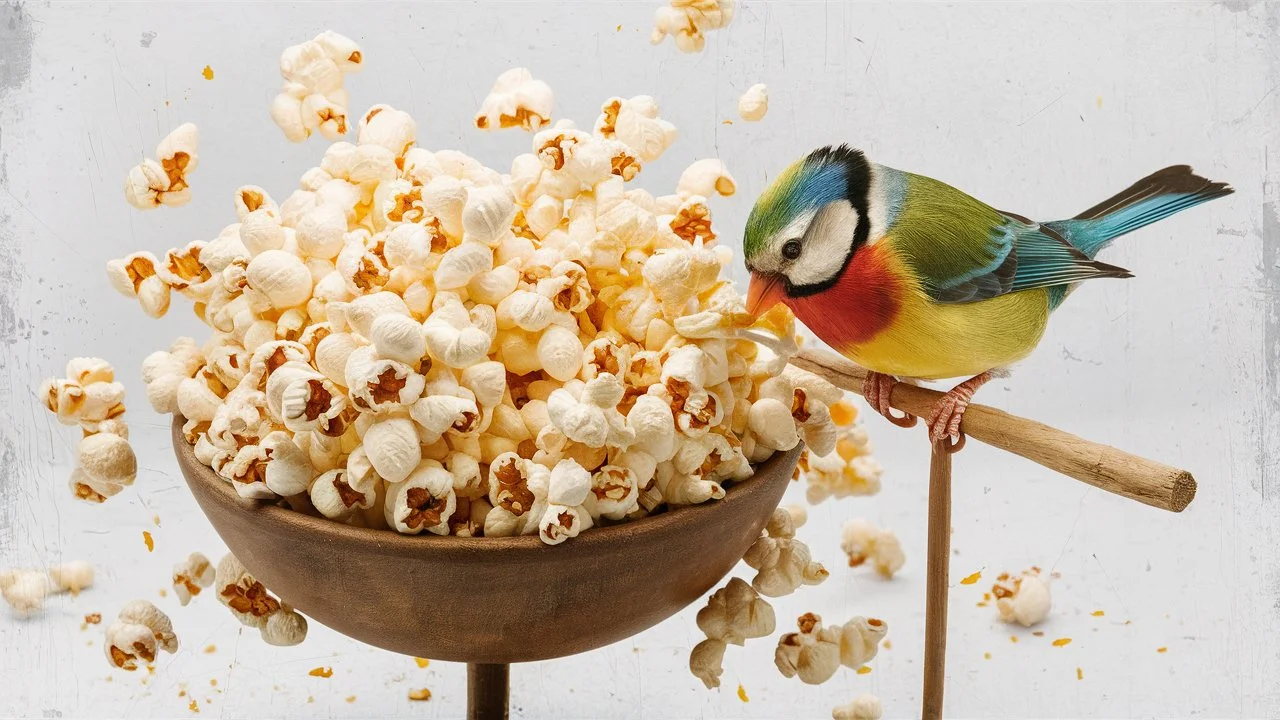
Nutritional Value of Popcorn for Birds
Popcorn is a whole grain that contains small amounts of fiber, vitamins, and minerals. While it is not a nutritional powerhouse, it can still provide some benefits as a treat:
- Fiber: Aids in digestion.
- Carbohydrates: Provide a quick energy source.
- Vitamins and Minerals: Including magnesium and iron, which support overall health.
Preparing Popcorn for Birds in Summer
The way popcorn is prepared can significantly impact its safety and nutritional value for birds. Here’s how to ensure popcorn is bird-friendly:
Plain and Unsalted
Popcorn should be plain and unsalted. Salted popcorn can be harmful to birds as their bodies cannot handle high levels of sodium, which can lead to dehydration and other health issues.
- Avoid Salt: Even small amounts of salt can be toxic to birds.
Unbuttered and Unflavored
Butter and other flavorings commonly added to popcorn contain ingredients that can be harmful to birds, including unhealthy fats and artificial additives.
- Use Air-Popped Popcorn: Air-popped popcorn is the best option as it does not contain any added oils or flavorings.
Cool Down the Popcorn
Before offering popcorn to birds, ensure it has cooled completely. Hot popcorn can cause burns and be uncomfortable for birds to handle.
Benefits of Feeding Popcorn to Birds in Summer
Feeding birds popcorn in the summer can have several benefits:
Energy Source
- High in Carbohydrates: Popcorn provides a quick energy boost, which can be helpful for birds during active foraging and breeding periods in the summer.
Enrichment
- Mental and Physical Stimulation: Peeking and playing with popcorn can provide mental stimulation and physical activity for birds, helping to keep them active and engaged.
Easy to Prepare
- Convenient: Popcorn is easy to prepare and can be made in large batches, making it a convenient option for bird feeders.
Potential Risks of Feeding Popcorn to Birds in Summer
While popcorn can be a safe treat when prepared correctly, there are potential risks to be aware of:
Nutritional Imbalance
- Empty Calories: While popcorn provides energy, it lacks the comprehensive nutrients found in seeds, fruits, and insects that birds need for a balanced diet.
Mold and Bacteria
- Spoiled Popcorn: Popcorn left out in wet or damp conditions can quickly become moldy, which can be harmful to birds. Always ensure that popcorn is kept dry and fresh.
Overfeeding
- Dietary Balance: Popcorn should only be an occasional treat and not a staple of the bird’s diet. Overfeeding can lead to nutritional deficiencies.
Best Practices for Feeding Popcorn to Birds in Summer
To safely feed popcorn to birds during summer, follow these best practices:
- Prepare Plain, Air-Popped Popcorn:
- Use an air popper to make plain popcorn without any additives.
- Offer in Moderation:
- Popcorn should be a small part of a varied diet that includes seeds, nuts, fruits, and insects.
- Mix with Other Foods:
- Combine popcorn with other bird-friendly foods like sunflower seeds, millet, and dried fruits to provide a balanced diet.
- Monitor Freshness:
- Check the popcorn regularly and remove any that has become damp or moldy.
- Use Proper Feeding Stations:
- Place popcorn in feeders that protect it from moisture and contamination.
Alternatives to Popcorn for Summer Feeding
While popcorn can be a fun and occasional treat, there are other, more nutritious options to consider for feeding birds during the summer:
- Black Oil Sunflower Seeds: High in fat and energy, perfect for summer feeding.
- Fresh Fruits: Such as apples, berries, and melons, which provide hydration and natural sugars.
- Peanuts: High in protein and fat, offering a great energy source.
- Nyjer (Thistle) Seeds: Preferred by finches and other small birds.
- Mealworms: Provide protein and are especially beneficial during the breeding season.
Can Birds Eat Salted Popcorn?
Feeding birds can be a rewarding experience, but it is essential to understand what foods are safe for them. While birds can eat a variety of foods, some, like salted popcorn, pose significant risks. This guide explores whether birds can eat salted popcorn, the potential dangers, and safer alternatives for bird feeding.
Why Birds Should Not Eat Salted Popcorn?
Salted popcorn is not suitable for birds due to several critical factors. Here’s a detailed look at why salted popcorn should be avoided:
High Sodium Content
Birds have very different physiological responses to salt compared to humans. Their bodies are not designed to handle high levels of sodium.
- Kidney Stress: Birds’ kidneys are less efficient at excreting excess salt. High sodium intake can cause kidney damage or failure.
- Dehydration: Excessive salt can lead to dehydration as birds try to excrete the excess sodium.
- Toxicity: Even small amounts of salt can be toxic, leading to severe health issues or death.
Artificial Additives
Salted popcorn often contains other artificial additives, such as butter flavoring and preservatives, which can be harmful to birds.
- Unhealthy Fats: Butter or oil used in salted popcorn can lead to obesity and other health issues in birds.
- Chemicals: Additives and artificial flavorings can be toxic to birds, leading to digestive issues and other health problems.
Digestive Issues
Birds have delicate digestive systems that can be easily upset by foods that are too rich, salty, or oily.
- Gastrointestinal Distress: Salted popcorn can cause stomach upsets, diarrhea, and other digestive problems in birds.
Risks of Feeding Salted Popcorn to Birds
Feeding salted popcorn to birds carries several significant risks:
Salt Toxicity
- Symptoms: Symptoms of salt toxicity in birds include excessive thirst, dehydration, kidney dysfunction, lethargy, and even death.
- Severity: Birds can suffer from salt toxicity quickly, and the condition can be fatal if not addressed immediately.
Dehydration
- Increased Thirst: Birds consuming salted popcorn will experience increased thirst, leading to potential dehydration if fresh water is not readily available.
- Health Impact: Dehydration can cause severe stress on a bird’s body, impacting their overall health and ability to survive.
Nutritional Imbalance
- Empty Calories: Salted popcorn offers little nutritional value and can lead to a dietary imbalance, depriving birds of essential nutrients they need for health and vitality.
- Obesity: The high-fat content in buttered or oily popcorn can lead to obesity, which poses additional health risks for birds.
Safer Alternatives to Salted Popcorn
If you want to treat birds with popcorn, it’s crucial to offer it in a way that is safe and beneficial. Here are some safer alternatives and guidelines:
Plain, Unsalted, and Unbuttered Popcorn
- Preparation: Use an air popper to make plain popcorn without any added salt, butter, or oil. This ensures the popcorn is safe and healthy for birds.
- Serving Size: Offer popcorn in moderation as an occasional treat, not as a staple of their diet.
Bird-Safe Treats
Consider offering other nutritious and safe treats for birds:
- Black Oil Sunflower Seeds: These seeds are high in fat and energy, making them an excellent choice for birds.
- Millet: A favorite among small birds, millet is easy to eat and digest.
- Fresh Fruits: Apples, berries, and grapes (without seeds) provide vitamins and hydration.
- Nuts: Unsalted peanuts and almonds can be offered in moderation.
- Mealworms: An excellent source of protein, especially beneficial during breeding season.
Homemade Bird Treats
Creating homemade bird treats can ensure they receive a balanced and safe diet:
- Seed Mixes: Combine a variety of seeds, grains, and dried fruits to create a nutritious blend.
- Fruit Kebabs: Skewer pieces of fresh fruit and hang them near feeders for an interactive treat.
- Vegetable Snacks: Offer small pieces of vegetables like carrots, peas, and sweet potatoes.
Best Practices for Feeding Birds
To ensure the health and safety of the birds you feed, follow these best practices:
- Avoid Harmful Foods: Do not feed birds foods that are salty, sugary, fatty, or contain artificial additives.
- Provide Fresh Water: Always provide a fresh water source to keep birds hydrated.
- Clean Feeders Regularly: Ensure feeders are cleaned regularly to prevent mold, bacteria, and disease.
- Observe Moderation: Treats should be offered in moderation, with a focus on providing a balanced diet.
- Research Bird Diets: Understand the dietary needs of the bird species you are feeding to offer appropriate foods.
Can Birds Eat Sweet Popcorn?
Feeding birds can be a delightful activity, but it’s essential to know which foods are safe for them. While plain popcorn can be a safe treat when prepared correctly, sweet popcorn raises additional concerns. This guide explores whether birds can eat sweet popcorn, the potential risks, and safer alternatives for bird feeding.
Why Birds Should Not Eat Sweet Popcorn?
Sweet popcorn, like caramel corn or kettle corn, is typically coated with sugar, honey, or other sweeteners. While humans may enjoy these tasty treats, they are not suitable for birds for several reasons:
High Sugar Content
Birds have different dietary needs and their bodies are not designed to handle high amounts of sugar.
- Health Issues: Excessive sugar can lead to obesity, diabetes, and other metabolic disorders in birds.
- Energy Imbalance: High sugar levels can cause energy spikes and crashes, which can be harmful to birds.
Artificial Additives
Sweet popcorn often contains artificial flavors, colors, and preservatives that can be harmful to birds.
- Toxicity: Some artificial additives can be toxic, leading to digestive issues, organ damage, or even death in birds.
- Digestive Problems: Artificial ingredients can upset a bird’s delicate digestive system.
Unhealthy Fats
Many sweet popcorn varieties are made with butter, oils, or other fats that are not suitable for birds.
- Obesity: Unhealthy fats can contribute to obesity, which poses additional health risks for birds.
- Digestive Upset: High-fat content can cause digestive distress in birds.
Potential Risks of Feeding Sweet Popcorn to Birds
Feeding sweet popcorn to birds carries several significant risks:
Nutritional Imbalance
- Empty Calories: Sweet popcorn offers little nutritional value and can lead to a dietary imbalance, depriving birds of essential nutrients they need for health and vitality.
- Obesity: The high sugar and fat content can lead to obesity, which poses additional health risks for birds.
Health Issues
- Diabetes: Excessive sugar intake can lead to diabetes and other metabolic disorders.
- Digestive Distress: The artificial additives and high sugar content can cause gastrointestinal issues.
Toxicity
- Artificial Ingredients: Many sweet popcorn varieties contain artificial ingredients that can be toxic to birds, leading to serious health problems or death.
Safer Alternatives to Sweet Popcorn
If you want to treat birds with popcorn, it’s crucial to offer it in a way that is safe and beneficial. Here are some safer alternatives and guidelines:
Plain, Unsalted, and Unbuttered Popcorn
- Preparation: Use an air popper to make plain popcorn without any added sugar, salt, butter, or oil. This ensures the popcorn is safe and healthy for birds.
- Serving Size: Offer popcorn in moderation as an occasional treat, not as a staple of their diet.
Bird-Safe Treats
Consider offering other nutritious and safe treats for birds:
- Black Oil Sunflower Seeds: These seeds are high in fat and energy, making them an excellent choice for birds.
- Millet: A favorite among small birds, millet is easy to eat and digest.
- Fresh Fruits: Apples, berries, and grapes (without seeds) provide vitamins and hydration.
- Nuts: Unsalted peanuts and almonds can be offered in moderation.
- Mealworms: An excellent source of protein, especially beneficial during breeding season.
Homemade Bird Treats
Creating homemade bird treats can ensure they receive a balanced and safe diet:
- Seed Mixes: Combine a variety of seeds, grains, and dried fruits to create a nutritious blend.
- Fruit Kebabs: Skewer pieces of fresh fruit and hang them near feeders for an interactive treat.
- Vegetable Snacks: Offer small pieces of vegetables like carrots, peas, and sweet potatoes.
Best Practices for Feeding Birds
To ensure the health and safety of the birds you feed, follow these best practices:
- Avoid Harmful Foods: Do not feed birds foods that are salty, sugary, fatty, or contain artificial additives.
- Provide Fresh Water: Always provide a fresh water source to keep birds hydrated.
- Clean Feeders Regularly: Ensure feeders are cleaned regularly to prevent mold, bacteria, and disease.
- Observe Moderation: Treats should be offered in moderation, with a focus on providing a balanced diet.
- Research Bird Diets: Understand the dietary needs of the bird species you are feeding to offer appropriate foods.
Conclusion
In conclusion, birds can eat popcorn, but it must be prepared and served correctly to ensure their safety. Plain, unsalted, and unbuttered popcorn can be a delightful occasional treat for your feathered friends, providing enrichment and variety in their diet. However, always remember to offer popcorn in moderation and as part of a balanced diet to maintain your bird’s overall health and well-being. By following these guidelines, you can safely enjoy the fun and interaction of feeding popcorn to your birds while ensuring they remain happy and healthy.
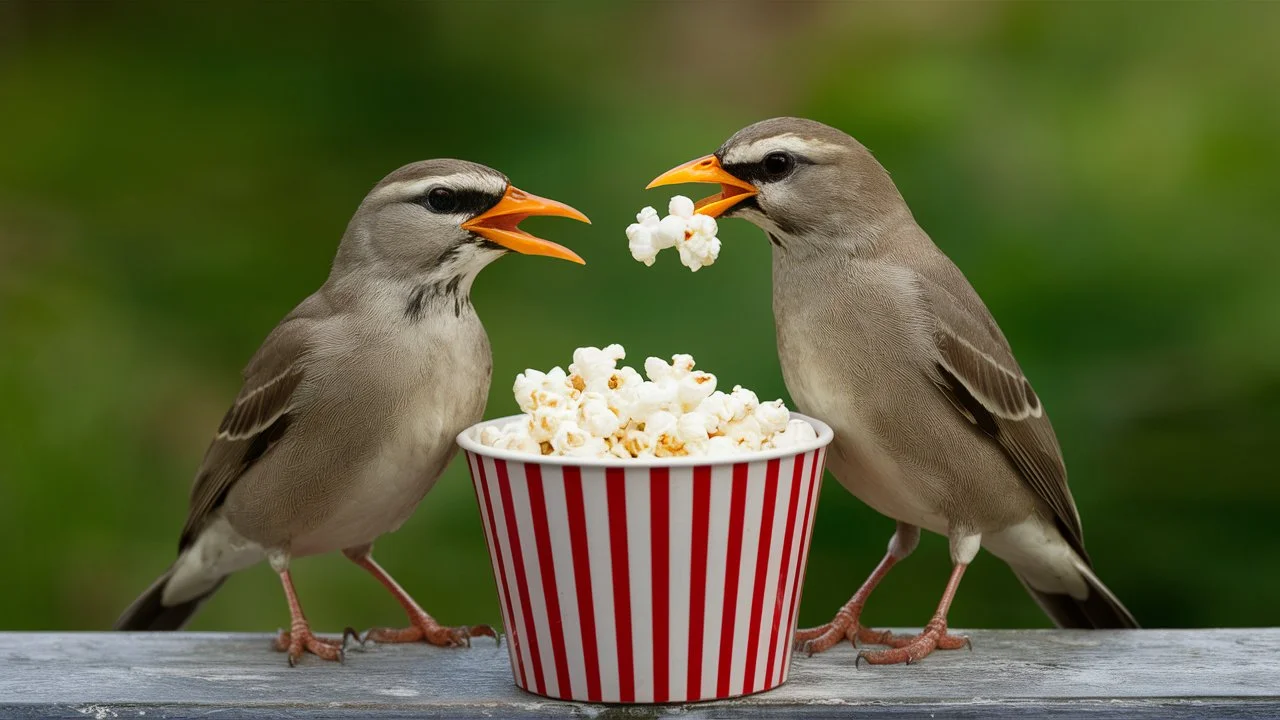
2 thoughts on “Can Birds Eat Popcorn? Discover the Safe Way Here”